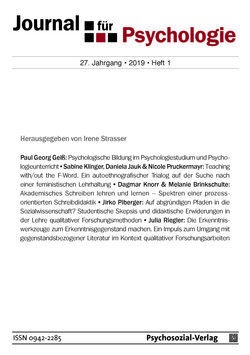27 Seiten, PDF-E-Book
Erschienen: Oktober 2019
Bestell-Nr.: 34020
https://doi.org/10.30820/0942-2285-2019-1-3
abonnieren
Paul Georg Geiß
Psychologische Bildung im Psychologiestudium und Psychologieunterricht (PDF)
Journal für Psychologie 1, 2019, 3-29
Sofortdownload
Dies ist ein E-Book. Unsere E-Books sind mit einem personalisierten Wasserzeichen versehen,
jedoch frei von weiteren technischen Schutzmaßnahmen (»DRM«).
Erfahren Sie hier mehr zu den Datei-Formaten.
In der amerikanischen und britischen Hochschuldidaktik wurde psychologische Bildung (»Psychological Literacy«) zur Leitidee für die Vermittlung von Psychologie. Psychologische Bildung ist auch ein anstrebenswertes Ziel für die Sekundarstufe II, da sie einen fachspezifischen Beitrag zur Allgemeinbildung zu leisten vermag. Die Definition von McGovern et al. (2010) ist jedoch nicht hinreichend domänenspezifisch ausgerichtet, um vor allem gymnasiale und universitäre Einführungskurse gut anleiten zu können. Dieser Beitrag zeigt, wie Sternbergs triarchisches Psychologiedidaktikmodell verwendet werden kann, um ein fachspezifischeres Verständnis von psychologischer Bildung zu entwickeln, das psychologisches Wissen, psychologische Denkfertigkeiten und reflexive psychologische Haltungen verbindet und dadurch einen kritischen Gebrauch der Alltagspsychologie ermöglicht. Wenn solche psychologische Denkfertigkeiten und Haltungen effizienter in Einführungskursen vermittelt werden sollen, dürfen die Lerngegenstände nicht unkritisch die disziplinäre Struktur des Faches »abbilddidaktisch« spiegeln, sondern müssen überlegter und selektiver hinsichtlich ihres Beitrags zur psychologischen Bildung ausgewählt werden. Gleichzeitig verweist der psychologische Bildungsbegriff auf die allgemeinbildenden Aspekte der Hochschuldidaktik, die in der Berufsbildung von Psychologen und Nichtpsychologen zu berücksichtigen sind.
Abstract:
In British and USA higher education psychological literacy has become a key concept for the teaching and learning of psychology. Psychological literacy is also a laudable goal of pre-tertiary psychology education, as it could enable a subject specific contribution to liberal arts education. Nevertheless, McGovern et al.’s definition is not subject specific enough to focus introductory courses on psychology in upper high school and degree study. This paper shows, how Sternberg’s triarchic model of psychology learning and teaching could be used to elaborate a more subject specific understanding of psychological literacy which interlinks psychological knowledge, psychological thinking skills and reflective psychological attitudes necessary to make critical use of common sense psychology. If psychological thinking and reflective psychological attitudes were more efficiently conveyed in introductory psychology classes, the teaching content should not uncritically mirror the disciplinary structure of the field and its unquestioned topical approach, indeed, teaching subjects should be more carefully reflected and selected to meet this general goal of psychology education. Similarily, our subject specific understanding of psychological literacy refers to the aspects of liberal education, which should not be neglected in the professional psychological training of both psychologists and non-psychologists.
Abstract:
In British and USA higher education psychological literacy has become a key concept for the teaching and learning of psychology. Psychological literacy is also a laudable goal of pre-tertiary psychology education, as it could enable a subject specific contribution to liberal arts education. Nevertheless, McGovern et al.’s definition is not subject specific enough to focus introductory courses on psychology in upper high school and degree study. This paper shows, how Sternberg’s triarchic model of psychology learning and teaching could be used to elaborate a more subject specific understanding of psychological literacy which interlinks psychological knowledge, psychological thinking skills and reflective psychological attitudes necessary to make critical use of common sense psychology. If psychological thinking and reflective psychological attitudes were more efficiently conveyed in introductory psychology classes, the teaching content should not uncritically mirror the disciplinary structure of the field and its unquestioned topical approach, indeed, teaching subjects should be more carefully reflected and selected to meet this general goal of psychology education. Similarily, our subject specific understanding of psychological literacy refers to the aspects of liberal education, which should not be neglected in the professional psychological training of both psychologists and non-psychologists.
Paul Georg GeißS. 3–29Psychologische Bildung im Psychologiestudium und Psychologieunterricht (PDF)
Journal für Psychologie 1, 2019, 3-29Sabine Klinger, Daniela Jauk & Nicole Pruckermayr S. 30–50Teaching with/out the F-Word. Ein autoethnografischer Trialog auf der Suche nach einer feministischen Lehrhaltung (PDF)
Journal für Psychologie 1, 2019, 30-50Dagmar KnorrS. 51–71Akademisches Schreiben lehren und lernen - Spektren einer prozessorientierten Schreibdidaktik (PDF)
Journal für Psychologie 1, 2019, 51-71Jirko PibergerS. 72–97Auf abgründigen Pfaden in die Sozialwissenschaft?. Studentische Skepsis und didaktische Erwiderungen in der Lehre qualitativer Forschungsmethoden (PDF)
Journal für Psychologie 1, 2019, 72-97Julia RieglerS. 98–122Die Erkenntniswerkzeuge zum Erkenntnisgegenstand machen. Ein Impuls zum Umgang mit gegenstandsbezogener Literatur im Kontext qualitativer Forschungsarbeiten (PDF)
Journal für Psychologie 1, 2019, 98-122
Journal für Psychologie 1, 2019, 3-29Sabine Klinger, Daniela Jauk & Nicole Pruckermayr S. 30–50Teaching with/out the F-Word. Ein autoethnografischer Trialog auf der Suche nach einer feministischen Lehrhaltung (PDF)
Journal für Psychologie 1, 2019, 30-50Dagmar KnorrS. 51–71Akademisches Schreiben lehren und lernen - Spektren einer prozessorientierten Schreibdidaktik (PDF)
Journal für Psychologie 1, 2019, 51-71Jirko PibergerS. 72–97Auf abgründigen Pfaden in die Sozialwissenschaft?. Studentische Skepsis und didaktische Erwiderungen in der Lehre qualitativer Forschungsmethoden (PDF)
Journal für Psychologie 1, 2019, 72-97Julia RieglerS. 98–122Die Erkenntniswerkzeuge zum Erkenntnisgegenstand machen. Ein Impuls zum Umgang mit gegenstandsbezogener Literatur im Kontext qualitativer Forschungsarbeiten (PDF)
Journal für Psychologie 1, 2019, 98-122

